A new trend: Houseplants as pets
Published 8:57 am Thursday, October 19, 2017

- Two pets, Mingus the Photobomber and a tough succulent that spends the summer in the garden.
According to conventional wisdom and some research, having a pet generally makes people calmer and healthier. Pets encourage people to exercise and to think about the needs of others — all good things. Unfortunately, many young people, the millennials, in particular, are finding that it’s difficult for them to keep pets or to have a baby. They’re working long hours building careers; they have erratic schedules and travel regularly; and they often live in cramped urban apartments where pets are either forbidden or highly regulated. Owning a dog in the city can mean that a person needs a reliable canine daycare center, as well as a trainer or behavioral expert and a professional walker, all expensive additions to the budget.
And yet, the need to nurture something remains strong. So rather than getting a dog or having a baby, people are growing indoor plants, sometimes as many as several hundred in just 500 to 600 square feet of living space. Tropical plants are particularly popular in some areas and there are even blogs that help people nurture their plant babies. A proud parent of “plant babies” blogs about the schedules he makes for his plants’ care. He generally sets aside several evenings every week to commune with and care for his plants. It’s when he prunes, cleans the dust off leaves, waters, fertilizes and generally enjoys each plant. He photographs especially handsome plants and shares the pictures with friends on Instagram. Sometimes he sketches favorite plants and even makes time-lapsed videos showing proper plant care techniques.
There’s the perfect plant baby or houseplant for everyone. If you’d like a plant baby, begin the adoption process by evaluating your lifestyle and plant rearing skills. Do you kill every plant that you touch or are you one of those charmed individuals who can grow anything? Are you overworked and never home or do you have extra time that could be spent pampering a finicky plant? And then finally, consider the growing conditions that you have to offer – sunny, dark, crowded, erratic temperatures, etc.
If, for example, you have a low light environment and don’t have much time for maintenance, then you might consider a snakeplant. They’re capable of withstanding all kinds of neglect. With just a modest amount of care, they’re beautiful. If you have bright light, but still need a plant that won’t require much attention, then you might consider a succulent or two or three. They come in a variety of shapes and sizes, most with great architectural interest. A row of small succulents in pots grouped on a tray or lined up on a windowsill would be lovely. Air plants would be quite interesting too, but are best left to plant parents willing to spend time fussing over them. Yes, they grow without soil, but they need regular misting to provide moisture. Some grow best in special plant stands that have been designed especially for air plants.
If you want something exotic but don’t have the time or skills to grow orchids, then you should definitely try a Marimo moss ball. It’s not really a moss ball but a colony of freshwater algae that gets its shape from the constant motion of the lake water where it grows. A Marimo moss ball is cute and fluffy and everyone will want to know all about it. Maintaining one is easy. Just put it in a clear container of filtered water and put the container in a cool location that doesn’t get direct light. Think far away from a window and a source of heat. About every two weeks, change the water, squeeze the Marimo and then roll it back and forth in your hands to help keep the round shape. With proper care, a Marimo can live for at least several hundred years and may even produce another Marimo ball.
It’s all about nurturing another living creature, relaxing, and, yes, learning something new too. Try a pet plant. You may find that it’s just as rewarding as a dog but won’t leave muddy paw prints on the kitchen floor or threaten the painters.
Cynthia Wood is a master gardener who writes two columns for The Herald. Her email address is cynthia.crewe23930@gmail.com.





